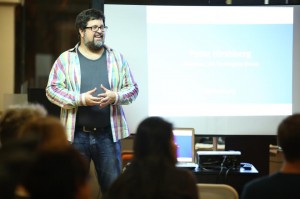Hmmmm – funny thing what talking to Chris Pirillo can do to someone. Another issue we talked about the other day had me thinking just now about some of the issues I originally brought up with The Noble Pursuit. We were talking about the goals I have for BrainJams and what I hope people can come away with at the end of the day.
One of the main reasons I focus on trying to get a diverse group of attendees is to facilitate people getting to know people who are less like themselves. This exposure not only encourages learning, it also helps people find the similarities we have with each other as opposed to the differences. In short, I think the events can build a greater sense of trust between different types of people. This trust can be the basis for a greater understanding of the world, and a step towards improved collaboration in everything people do. Getting to know someone in the way I envision will happen at a BrainJams event can be a very positive, visceral sort of experience.
Anyway, this line of thinking lead me to my old story about how the geeks and the suits not trusting one another has cost the economy so much money. The other portion of that story is the cost of proprietary systems. Which brings me back to the new insight.
The 2 most expensive business problems I see have to deal with the same issue – compatibility. The compatibility between people and the compatibility between systems. The ability of people to understand and trust one another in order to more effectively collaborate has a dramatic effect on the top and bottom line of a company. This is especially more so in the Knowledge Economy, where connecting the dots and figuring things out together can make all the difference between success and failure. The tremendous effort required to get disparate IT systems working together (because they were not designed, built or purchased from a holistic perspective, but more often than not from a dysfunctional politically charged review environment. Then of course, there is the impact of mergers, system obsolescence, version upgrades and the craziness of trying to keep every user up, stable and connected. USB works though, so there is hope on many fronts.
I wonder if anyone has done a study on the total costs these 2 issues have cost the economy. From missed deadlines that created missed opportunities. From contractual obkigations that were broken. From efforts and large monies expended in a direction to only be abandoned – all in the name of incompatibility of the systems and the people that use them. My best is that it is well over several hundred billion dollars each decade if not trillions of dollars.
Dr. Arky Ciancutti wrote a great book called Built On Trust which is a must read of anyone seeking to further their organizations ability to more effectively collaborate and be successful at what they do.
What might we be able to do to get more people to trust others when their past experiences have taught them not to trust anyone on their word? Does anyone else have some ideas in this direction?
Technorati Tags: ad-hoc+collaboration, brainjamming, brainjams3dec2005, brainjams:planning, The+Open+Web, Web2.1
